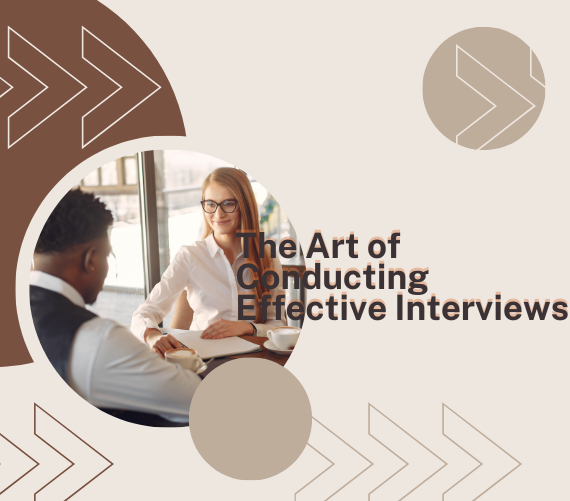Unveiling Insights: The Art of Conducting Effective Interviews

- 26 Jan 2024
- w3builders
- Interviews and Expert Opinions
Unveiling Insights: The Art of Conducting Effective Interviews
Interviews are a powerful tool for gaining insights, capturing expertise, and sharing valuable perspectives. In this blog, we'll explore the art of conducting effective interviews, whether for content creation, research, or journalistic purposes.
1. Research and Preparation:
Before the interview, thoroughly research the interviewee and their background. Familiarize yourself with their work, achievements, and any relevant topics. This not only shows respect but also helps you craft informed and meaningful questions.
2. Define Your Objectives:
Clearly define the objectives of the interview. Whether you aim to extract expert opinions, gather insights for content creation, or share valuable information with your audience, having a clear purpose will guide your line of questioning.
3. Establish a Comfortable Environment:
Create a comfortable and relaxed environment for the interviewee. This can be achieved through a friendly introduction, small talk, or ensuring that the interview setting is conducive to open conversation. A relaxed interviewee is more likely to share valuable insights.
4. Craft Thoughtful Questions:
Develop a set of thoughtful and open-ended questions that encourage in-depth responses. Avoid yes/no questions and instead focus on queries that prompt the interviewee to elaborate on their experiences, opinions, and expertise.
5. Active Listening:
Practice active listening throughout the interview. Pay attention to the interviewee's responses, ask follow-up questions based on their answers, and show genuine interest in their insights. This not only enhances the quality of the interview but also fosters a positive rapport.
6. Flexibility in Approach:
Be prepared to adapt your approach based on the flow of the conversation. While it's essential to have a structured set of questions, being flexible allows you to explore unexpected but valuable avenues that may arise during the interview.
7. Foster a Conversation, Not an Interrogation:
Frame the interview as a conversation rather than an interrogation. This approach helps create a collaborative atmosphere, making the interviewee feel more comfortable and encouraging a more authentic exchange of ideas.
8. Utilize Technology:
Leverage technology to conduct remote interviews. Video conferencing tools or podcasting platforms can facilitate engaging conversations with experts, regardless of geographical constraints. Ensure a reliable connection and test the technology beforehand.
9. Respect Time Constraints:
Respect the interviewee's time constraints. Clearly communicate the expected duration of the interview and adhere to the agreed-upon schedule. This demonstrates professionalism and consideration for the interviewee's schedule.
10. Follow-Up and Gratitude:
After the interview, send a follow-up email expressing gratitude for the interviewee's time. Share any relevant content resulting from the interview and maintain open communication for potential future collaborations.
Conducting effective interviews is both an art and a skill. By approaching interviews with thorough preparation, thoughtful questions, active listening, and flexibility, you can unlock valuable insights and expert opinions that enrich your content and provide value to your audience.
More Blog Categories
More Blogs from us
-
26 Jan 2024 Interviews and Expert Opinions
The Art of Extracting Insights: Interviewing Industry Experts

Interviewing industry experts is a valuable endeavor that can provide unparalleled insights and thought leadership. In this blog, we'll delve into ...
-
24 Jan 2024 Content Creation
Crafting Compelling Content: A Guide to Successful Content Creation

Content creation is at the core of any effective digital marketing strategy. In this blog, we will delve into the key aspects of creating compellin...
-
24 Jan 2024 Freelancer vs Firm
The Freelancer vs Company Dilemma: Making the Case for Professionalism

In the digital age, the choice between hiring a freelancer or a professional company for website design and development is a critical decision for ...
-
02 Feb 2024 Tips for Small Businesses
Streamlining the Shopping Experience: The Importance of Guest Checkout in ecommerce

In the dynamic realm of e-commerce, where convenience and efficiency are paramount, online retailers constantly strive to enhance the user experien...
-
26 Jan 2024 Digital Marketing Tips
Unleashing the Power of Content Marketing

Content marketing remains a fundamental pillar of digital marketing, allowing businesses to provide value, build trust, and establish authority. Th...
-
26 Jan 2024 Digital Marketing Tips
The Power of Email Marketing: Strategies for Success

Email marketing remains a cornerstone of digital marketing, providing a direct and personalized channel for communication. In this blog, we'll delv...